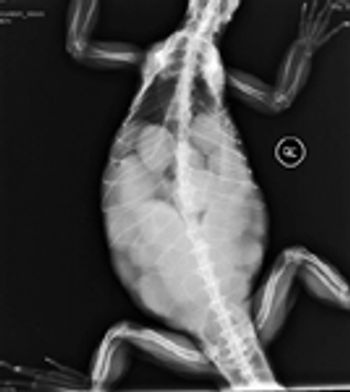
In general, all reptiles are covered with scales.

In general, all reptiles are covered with scales.

The rise in popularity of herpetoculture over the past two decades has led to an increased number of reptiles being imported and captive reared to meet the demands of herpetoculturists.

Diagnostic imaging is an underutilized resource in herpetological medicine.

"Bad laboratory data are worse than no laboratory data at all."

It has been well established that the majority of bacterial pathogens affecting reptile patients are of the gram negative type.

Many of the exotic species we deal with have evolved to mask their illness to avoid predation.

Nontraditional mammalian species, such as ferrets, lagomorphs, marsupials, hedgehogs, and rodents, are stoic by nature and have evolved to mask their illness to avoid predation.

The majority of the exotic pet cases presented to veterinarians are dehydrated as a result of a chronic disease.

Reptiles take a very long time to get sick. Likewise, amphibians tend to hide disease for prolonged periods.

One of the main reasons for neutering exotic pet mammals is to control reproduction.

Foreign body ingestion is particularly a problem in ferrets less than one year of age.

In general, ferrets are hardy and make excellent surgical candidates.

A simple ventral midline celiotomy provides limited exposure to most abdominal organs in birds.

The respiratory system of birds is significantly different, both physiologically and anatomically, from that of mammals.

Anorexia is a common presenting complaint and dental disease should be considered in any rabbit that presents for anorexia.

Veterinarians and owners soon may be the only ones allowed to handle exotic animals in Missouri.

Some lizards will do push-ups to communicate with other lizards, according to a study by researchers who visited a rain forest in Puerto Rico.

Nashville, Tenn. -- The deadline to apply for the newest American Board of Veterinary Practitioners (ABVP) certification, exotic companion mammal practice, is quickly approaching.

Manhattan, Kan. -- There soon will be online help for veterinarians with camelid questions, thanks to a $20,000 gift to Kansas State University's College of Veterinary Medicine from the Mid-America Alpaca Foundation.

For too long, we have been too quiet regarding what exotic animals are sold as pets in this country.

A 2-year-old intact female bearded dragon (Pogona vitticeps) was presented for evaluation of weakness and anorexia.

Researchers studied whether noisy environments would deter bats from seeking insects.

Gastrointestinal diseases and disorders are common in avian patients. This presentation will give an overview of anatomy and clinical presentations of gastrointestinal (GI) disease in birds.

Neoplastic disease is a common clinical entity in exotic small mammals (rabbits, ferrets, rodents). Affected patients can exhibit a wide variety of clinical conditions.

Nutrition is the process by which birds and all other animals consume food items and utilize it in the body for growth, tissue replacement or repair and the continuance of life.